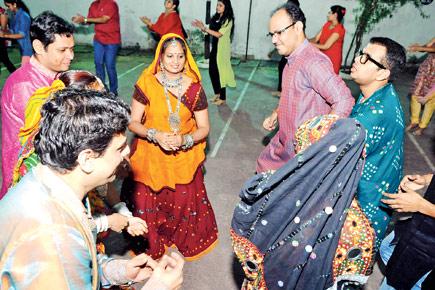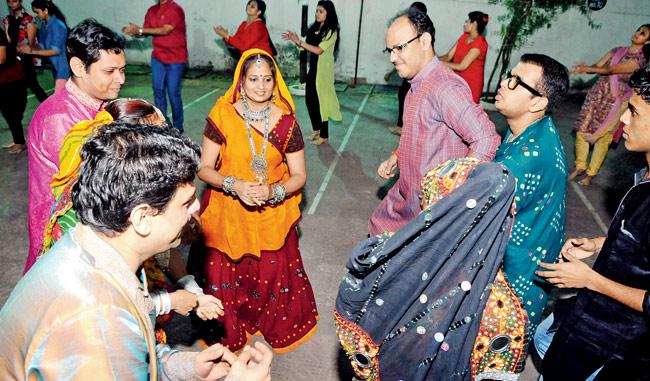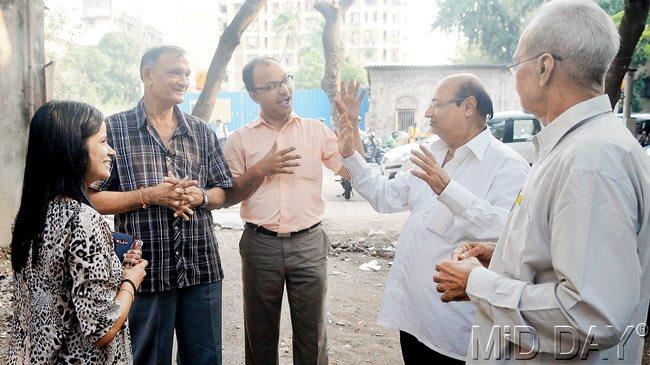At Borivali’s Mayfair Banquets, on Friday, more than 200 deaf people from around the country will gather to celebrate Dussehra with garba and dandiya

Members of Navratri Navyuvak Mandal practice their moves at a celebration in Borivali
At Borivali’s Mayfair Banquets, on Friday, more than 200 deaf people from around the country will gather to celebrate Dussehra with garba and dandiya. The Navratri Navyuvak Mandal will celebrate the 23rd year of the programme has dancing and a best dressed competition, as well.
ADVERTISEMENT

DANCE ALONG: Members of Navratri Navyuvak Mandal practice their moves at a celebration in Borivali. Pics/Nimesh Dave
World of our own
The idea to start a Navratri celebration for the deaf came to Rajesh Vora who is deaf too, in 1992. He explains through his son Ronak who interprets for him, “I used to attend Navratri held in my building, but I always felt out of place. It was very uncomfortable to dance slow and not understand the beat. People would laugh and stare at me, which hurt my feelings. I thought that having a special Navratri for people like me, would help us avoid feeling awkward.”

FESTIVE TALKS: (L-R) Jigna Samani, Nirmal Gadhia, Tushar Wani, Rajesh Vora and Vinod Mehta from Navratri Navyuvak Mandal
Vora says that he spoke to his friends Nirmal Gadhia and Vinod Mehta, who are deaf too about his idea. He adds, “We planned everything around Holi in 1992 and it took six months to network with friends and well wishers. We collected R 500 per person which at that time was a reasonable sum. We decided to use string and wind instruments which produce rhythms and vibrations that we can ‘feel’. We actually had a test and then selected the songs and music for the first Navratri.”
His co-founder Nirmal Gadhia says, “We collected around R 14,000 and there were around 20 people who came for the first Navratri we organised. The event was held at Malad and the hall where we had it was given for free so we ended up spending R 18,000 on gifts, food, music and prizes. People hired traditional costumes and dressed up in their best clothes. Even today the same practice is followed of wearing traditional Navratri costumes.”
“Ours is the only Navratri event which gives people food. Our main aim was to make the festival more about people having fun and feeling good about themselves. We chose Dussehra day as people go for Navratri every day and so they would be free to come, here and also because the day is a holiday,” says Vora.
Just beat it
Jigna Samani who has been attending the Navratri Navyuvak Mandal garba and dandiya celebrations for the last eight years says, “I came to know about it through my friend Falguni who is the secretary of the mandal, Tushar Wani’s wife. All three of us are deaf. I attended normal Navratris and always felt awkward. People stare, and then when they come to know that I am deaf they behave in a strange manner which keeps me from enjoying the dance. But here we all dance at our own steps.”
Agreeing with her Tushar Wani says through Chhaya his mother who interprets, “We generally understand by lip reading but when it comes to songs it becomes difficult to understand. Here we dance at our own pace and do not feel awkward about it. There is no right or wrong dance step, enjoying ourselves is what is paramount.”
Vora says, “Our interpreters or friends who can hear or those who among us use hearing aids, dance and do a step and then we follow. Also, over the years we have come to understand the garba and dandiya beats and so we know what steps need to be done when. We mentally count numbers and then dance.”
“There is no awkwardness, bad vibe or shame if we do our own steps or dance the way we want. We can be ourselves and enjoy the festival in its true spirit,” says Vinod Mehta.
Love and community
Mehta adds, “When we saw the fun people had at the first Navratri, we kept organising the event every year. After 2005, due to the intense heat in September-October we started booking an air-conditioned (AC) hall.”
The Navratri for the deaf started seeing people coming from Ahmedabad, West Bengal, other parts of Maharashtra, Delhi, Karnataka, etc. “It became more of a community celebration for the deaf in India. Also, many young people of marriageable age met here at the event and fell in love. The Navratri celebration made it possible for deaf people to meet each other and find suitable life partners,” says Nirmal Gadhia.
Tushar Wani who has taken over from the original committee of Gadhia, Vora and Mehta as the main organiser says, “We use social media — Facebook, WhatsApp — to plan the Navratri, now. Those who come from other parts of the country stay in our houses. It is like a family get-together for all of us.”
Sound of music
Wani’s mother Chhaya who helps organise the Navratri says, “I started helping Tushar with bookings around 10 years ago when he was given responsibility of the mandal. I interpret for my son when he communicates with people.”
The Rotary Club of Borivali, Inner Wheel Club of Borivali, Dhwani Foundation and Miloni Foundation have helped the mandal with funds. Tushar explains “This year, the organising committee has spent around R 2.5 lakh. Our entry fee continues to be R 500 for adults and R 350 for children (8-12 years).”
Chhaya adds, “When I see all these deaf people, young and old, dancing and enjoying themselves, I start to wonder who is really disabled.”
“Some of my deaf friends in America were also inspired by this idea and started a Navratri for deaf people there as well. I got a message from a few of them which I will speak about at our event on October 3,” ends Vora.
 Subscribe today by clicking the link and stay updated with the latest news!" Click here!
Subscribe today by clicking the link and stay updated with the latest news!" Click here!






